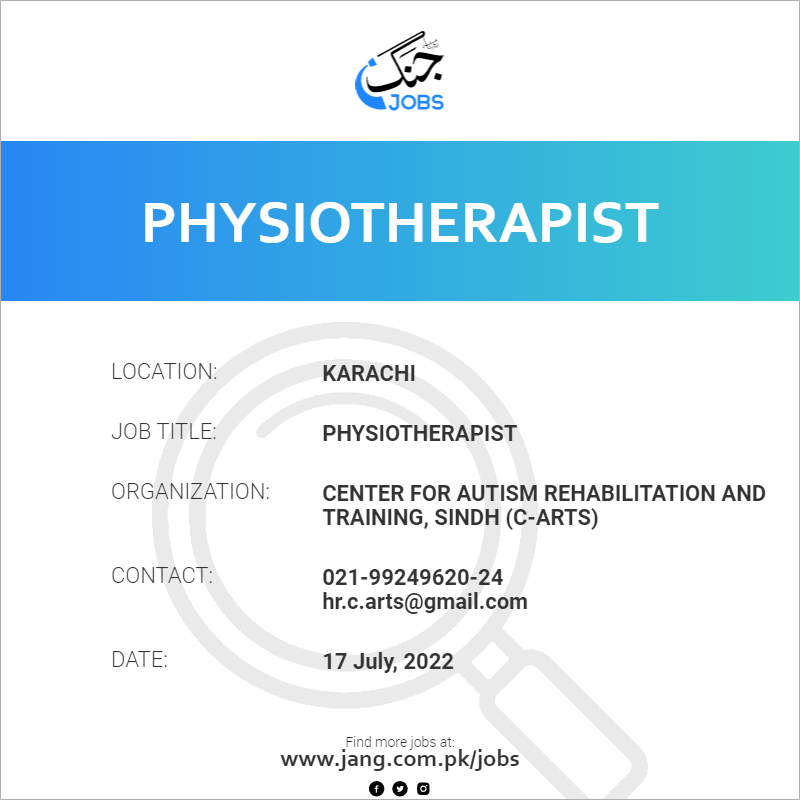Doctor of Physical Therapy (DPT) is a five-year degree program in Pakistan that provides the required education and training necessary for graduates to embark on a professional career in physical therapy. The DPT degree is classified as a level 6 qualification according to the National Qualification Framework (NQF) of Pakistan. After completing their studies, DPT graduates have many opportunities in the medical field in Pakistan for starting their professional careers and future growth, both nationally and internationally. They can work in hospitals, physical therapy centers, clinics, rehabilitation centers, and sports clubs.
Written by: Mohammad Abdullah Humayun
In this article, you will know:
- What is Doctor of Physical Therapy (DPT)
- Jobs of DPT in Pakistan
- Salary of Physiotherapist in Pakistan
- Find Out This Field is a Match for You
And much more. Keep reading.
What Is DPT And What Do Physiotherapists Do?

DPT stands for Doctor of Physical Therapy. DPT is a five-year program in Pakistan.
Physiotherapy is a subfield of medicine and health sciences. It is concerned with the rehabilitation of those people who have been handicapped as a result of an accident, trauma, operation, old age,any congenital or acquired disease or a fracture and injury especially those where muscles tendons and bones have come at the ground zero.
A physiotherapist’s work involves restoring a normal muscle strength, muscle movement, improving the degree of joint mobilization and if we talk about an esteemed one, one of his biggest jobs is to provide rehabilitation especially to a patient who has accepted his disability in his life.
Hence, patient’s counseling is also an essential aspect. These patients usually suffer from depression and low self-esteem.
To restore their healthy body function, it is vital to motivate them and give them emotional support so that they feel confident enough about themselves.
A career in physiotherapy usually starts with F.Sc pre-medical. After that any aspirant of a profession in which he wants to dedicate his knowledge not only to seek earnings but also to serve humanity by getting them their cure and counselling one can either go for an MBBS or Doctorate in Physical Therapy.
So students with qualities like empathy and concern for the poorly abled persons should opt this field as it suits their aptitude. This kind of behaviour is also desired for this profession, where if your urge is for the money only it can become a hindrance in your genuine doctorhood.
Interest in the physiology of the human body is also vital.Because it will be one of the major subjects that will prevail for quite a long, round about a timespan of more than 2 years either in the case of DPT or MBBS.
Physiotherapists usually work in hospital settings or private clinics. They are also part of rehabilitation institutes. Sometimes they are also employed by nursing homes and old homes also.
What Are The Required Skills In Physiotherapy?
Interest in social work is vital for this field. Ability to rapidly build good reputations with people is also necessary.If you possess humble behaviour and have great patience you can ace your job.
People who have a friendly demeanor and good socializing qualities are very suitable for this work. Sound knowledge in the field of anatomy, biology and physiology is also required.
If you have a good knowledge and a keen understanding of your subjects, you can become a master in your field. This is because sensitivity of our patents ailment demands that it should be treated with a compact sufficiency of understanding.
Physiotherapists have to work with people who are often uncooperative, so patience is a prerequisite.
Good coordination skills also come in handy because often physiotherapists are part of a large program involving physicians, surgeons, nursing staff, paramedics, etc.
And do you know 77% of Employers Not Happy with the Quality of Pakistani Graduates
These are the skills that are lacking in fresh graduates in Pakistan
- Verbal Communication (83.63%)
- Verbal communication is used to express oneself through the use of spoken words. It involves the sharing of information between people. Whether shared is factual or opinionated. Verbal communication aids in the understanding of the receiver which in turn enhances the relationship between sender and receiver.
- Effective verbal communication allows one to get his or her point across without causing unnecessary conflict amongst his or her peers. It also allows one to see things from another perspective.
- Verbal Communication is the process of sending information through the medium of words. A lot of information can be communicated through this form of communication as it allows us to deliver a lot of information in a very short span of time.
- We can use verbal communication while talking to someone face-to-face, on the phone or through video conferencing. The communication through words is divided into two different types, namely, oral and written communication. However, both these forms have their own advantages and disadvantages.
- Positive Attitude (71.93%)
- Team Working (64.91%)
- Critical Thinking (59.06%)
- Self Confidence (59.06%)
- Written Communication (57.31%)
- Drive &Resilience (57.31%)
- Stress Tolerance (47.37%)
- Adaptability (46.20%)
- Time Management (45.61%)
- Self-Awareness (45.03%) and Planning &Organizing (45.03%)
- Integrity (43.86%)
What Are The Career Prospects Of Physiotherapy?
- Orthopedic Physiotherapist:
Their job is related to bone and joint injuries. For example, injuries acquired as a result of a traffic accident, sports-related trauma, accidental fall, tripping, etc. They work to restore normal or near-normal mobility at affected joints.
- Geriatric Physiotherapists :
Their job involves working with people of old age. Old age predisposes a person to different ailments many of them related to bodily movements or lack of movement. For example, Parkinsons Disease involves unwanted movements which are often involuntary. Physiotherapists work with these patients to restore their healthy balance of movements.
- Pediatric Physiotherapists:
Pediatric physiotherapists have a delicate job. They work with children suffering from congenital anomalies, for example, down syndrome, Duchenne muscular dystrophy, etc. Patients suffering from these conditions are unable to move like children of the same age group. They also work with children who have to undergo significant surgery after trauma.
- Occupational Physiotherapists:
Sometimes a person becomes unable to resume his or her job after an injury. This is a challenging situation as it deprives a whole family of the sole bread earner. Occupational physiotherapists work with these individuals to restore their normal movements so that they can resume their job.
For example, a driver who has suffered some injury of hand muscles has to undergo physiotherapy before he is able to work again.
- Sports Physiotherapists:
They work with athletes like cricketers, footballers, swimmers, runners, etc. who are suffering from some injury and therefore are unable to take part in concerned sports. Physiotherapy is an essential aspect of sports medicine. All major sports federations employ expert and reputable physiotherapists for well being of their athletes and their careers.
What Are The Important Points To Be A Physiotherapist?
Interests:
If you have interests in the following things, then this field is a match for you:
- Sports
- Medicine
- Social work
- Nursing
- Physiology
- Pediatrics
Academic Qualifications:
Fsc pre medical is required. After that, you can either pursue a doctorate in physical therapy or MBBS. After MBBS you can acquire FCPS degree in physical therapy
Work Form:
Work is often confined to office hours.
Work Place:
Place of work is usually a hospital setting or a clinic. Pediatric institutes and old homes also employ physiotherapists.
Obstacles:
It is a very challenging job emotionally. A person has to have healthy nerves and calm attitude to work in this field. Patience is of utmost importance. Empathetic attitude is also a prerequisite.
What Are Physiotherapist Salaries In Pakistan?
The average Physiotherapist salary in Pakistan is PKR 320,952 per year or PKR26,746 per month. Entry-level positions start at PKR 26,000 per month while most experienced workers make up to PKR 190,000 per month.
You can find DPT jobs in Pakistan from
Here is the sector-wise salary in Pakistan, data taken from LUMS Prospectus that is a prestigious university in Pakistan.
- Health Care (Rs. 100,000 per month)
- FMCG (Rs. 85,571 per month)
- Home Appliances (Rs. 75,000 per month)
- Engineering (Rs. 75,000 per month)
- Group/Conglomerate (Rs. 71,676 per month)
- IT/Technology (Rs. 61,676 per month)
- Textile (Rs. 55,000 per month)
- Transport (Rs. 55,000 per month)
- Banking/Financial (Rs. 52,042 per month)
- Consulting (Rs. 52,042 per month)
- Manufacturing (Rs. 50,000 per month)
- Packaging (Rs. 50,000 per month)
What Is The Future Of Physiotherapy Jobs In Pakistan?
When you type the DPT’s jobs in Pakistan, you can also write your city name instead of Pakistan to find the jobs.
Pro Tip:
Go to Tool>Select Within 24 Hours. You will be the first to apply for the job hence more chances for the job getting in the industry.
You can also use Google Image that is a handy tool for finding jobs.
You can search the jobs in your city or province, and you can conclude either you should select this field or not based on the jobs available.
What Are The Universities In Pakistan Offering Admissions In DPT?
These are the universities that are offering DPT in Pakistan.
| Institute | City |
| 1. Shaheed Zulfiqar Ali Bhutto Medical University, Pims | Islamabad |
| 2. Jinnah Sindh Medical University | Karachi |
| 3. University Of Karachi | Karachi |
| 4. University Of Sialkot | Sialkot |
| 5. Foundation University | Islamabad |
| 6. Bahria University Medical &Dental College | Karachi |
| 7. Indus University | Karachi |
| 8. Iqra University [kch] | Karachi |
| 9. Metropolitan University Karachi | Karachi |
| 10. Nazir Hussain University | Karachi |
| 11. Hajvery University | Lahore |
| 12. Nur International University | Lahore |
| 13. Abasyn University | Peshawar |
| 14. Cecos University Of Information Tech. &Emerging Sciences | Peshawar |
| 15. City University Of Science &Information Technology | Peshawar |
| 16. Iqra National University | Peshawar |
| 17. Riphah International University | Faisalabad |
| 18. Riphah International University ( Rawalpindi Campus ) | Rawalpindi |
| 19. The University Of Lahore, Sub Campus | Sargodha |
| 20. Pakistan Institute Of Medical Sciences | Islamabad |
You can search for other universities in Pakistan. How?
Just Google, and you will find.
To find the DPT department of any university, just type DPT + University name like
Moreover, you can call them.
What Is The Trend Of Physiotherapy In Pakistan?
Google has created a fantastic tool called Google Trend that shows the searches being done by the people living in the country or city.
I am searching do people search Physiotherapy in Pakistan? If so, which province or city.
Here you can see it all.
Recent PHYSIOTHERAPY Jobs
Did you like the article? Do you feel something is missing in the article that I should write about? Leave your comment below, it means a lot to me





FAQs
Q: What is DPT and what do physiotherapists do? A: DPT stands for Doctor of Physical Therapy. It is a five-year degree program in Pakistan that trains students to become physiotherapists. Physiotherapists help people who have problems with their muscles, bones, joints, or nerves. They use exercises, massages, machines, and other methods to improve their health and function1.
Q: What are the skills required for a physiotherapist? A: A physiotherapist should have good knowledge of human anatomy, physiology, and pathology. They should also have good communication, interpersonal, and problem-solving skills. They should be able to work with different kinds of patients and adapt to their needs. They should also have empathy, compassion, and patience1.
Q: What are the branches of DPT? A: DPT has many branches or specializations that focus on different areas of physical therapy. Some of them are:
- Orthopedic Physiotherapy: It deals with the problems of bones, joints, muscles, and tendons.
- Neurological Physiotherapy: It deals with the problems of the brain, spinal cord, and nerves.
- Cardiopulmonary Physiotherapy: It deals with the problems of the heart, lungs, and blood vessels.
- Pediatric Physiotherapy: It deals with the problems of children and adolescents.
- Geriatric Physiotherapy: It deals with the problems of older adults.
- Sports Physiotherapy: It deals with the problems of athletes and sports injuries1.
Q: What are the important points to consider before choosing DPT as a career? A: Some of the important points to consider before choosing DPT as a career are:
- DPT is a challenging and demanding field that requires hard work, dedication, and passion.
- DPT is a rewarding and satisfying field that allows you to help people and make a difference in their lives.
- DPT is a competitive and growing field that offers many opportunities for career advancement and development.
- DPT is a flexible and diverse field that allows you to work in different settings and with different kinds of patients1.
Q: What are the jobs of DPT in Pakistan? A: DPT graduates can find jobs in various sectors and organizations in Pakistan. Some of them are:
- Hospitals: They can work as physiotherapists in public or private hospitals and provide services to inpatients or outpatients.
- Physical Therapy Centers: They can work as physiotherapists in physical therapy centers or clinics and provide services to clients who need rehabilitation or prevention.
- Rehabilitation Centers: They can work as physiotherapists in rehabilitation centers or homes and provide services to clients who need long-term care or recovery.
- Sports Clubs: They can work as physiotherapists in sports clubs or teams and provide services to athletes or sportsmen who need performance enhancement or injury management1.
Q: What is the salary of a physiotherapist in Pakistan? A: The salary of a physiotherapist in Pakistan depends on many factors such as qualification, experience, location, sector, and organization. According to one source1, the average salary of a physiotherapist in Pakistan is PKR 320,952 per year or PKR 26,746 per month. However, this may vary depending on the market demand and supply.
Q: How to get admission in DPT in Pakistan? A: To get admission in DPT in Pakistan, you need to meet the following criteria:
- You should have completed F.Sc pre-medical or equivalent with at least 60% marks.
- You should have passed an entry test conducted by the university or college offering DPT program.
- You should have applied for admission through online or offline mode according to the instructions given by the university or college offering DPT program1.
Q: What is the trend of physiotherapy in Pakistan? A: The trend of physiotherapy in Pakistan is increasing due to various reasons such as:
- The growing awareness and demand for physical therapy services among the public.
- The increasing number of diseases and disorders that affect the musculoskeletal system such as arthritis, osteoporosis, back pain, etc.
- The rising number of accidents and injuries that cause physical disability or impairment such as road accidents, sports injuries, etc.
- The aging population that needs more care and support for their mobility and function1.
Q: What are the benefits of studying DPT in Pakistan? A: Some of the benefits of studying DPT in Pakistan are:
- You can get a recognized degree that is equivalent to a level 6 qualification according to the National Qualification Framework (NQF) of Pakistan1.
- You can get a comprehensive education that covers both theoretical and practical aspects of physical therapy.
- You can get a hands-on experience that prepares you for the real-world challenges and scenarios of physical therapy.
- You can get a chance to learn from qualified and experienced faculty members who are experts in their fields.
- You can get access to state-of-the-art facilities and equipment that enhance your learning and skills1.
Q: What are the challenges of studying DPT in Pakistan? A: Some of the challenges of studying DPT in Pakistan are:
- You have to face a high level of competition and pressure to get admission in DPT program.
- You have to study a lot of subjects and topics that are complex and difficult to understand.
- You have to spend a lot of time and money on your education and training.
- You have to deal with the lack of standardization and regulation of physical therapy profession in Pakistan1.
